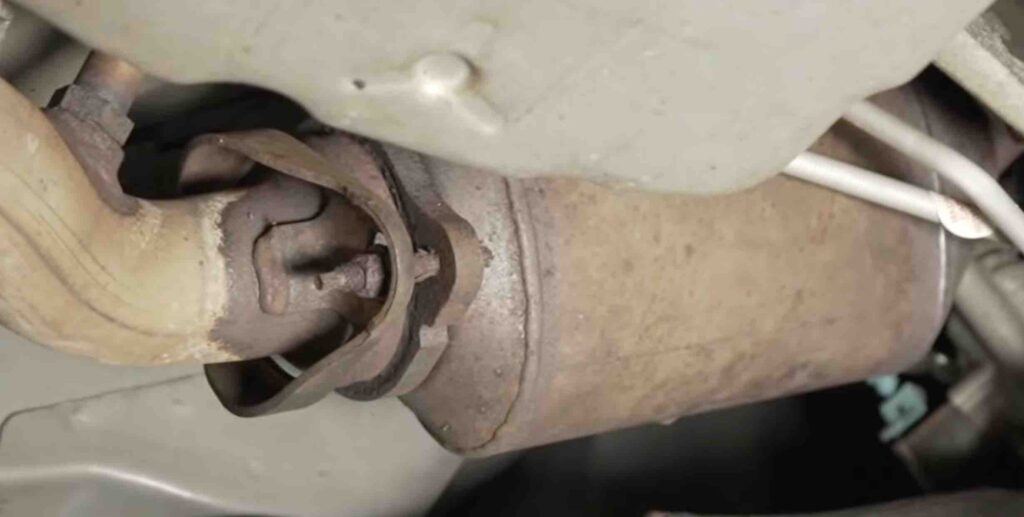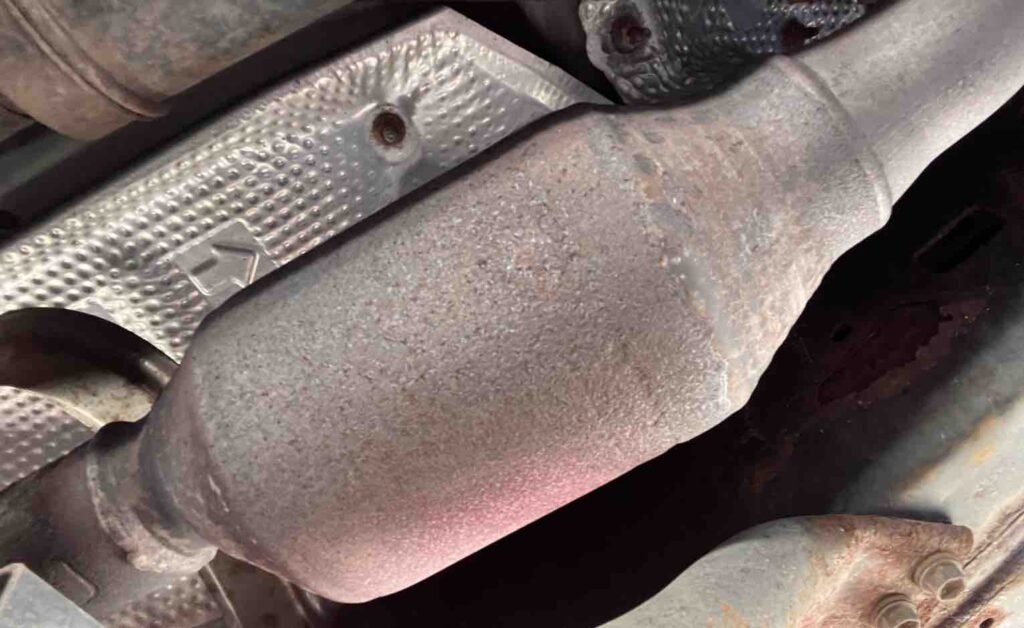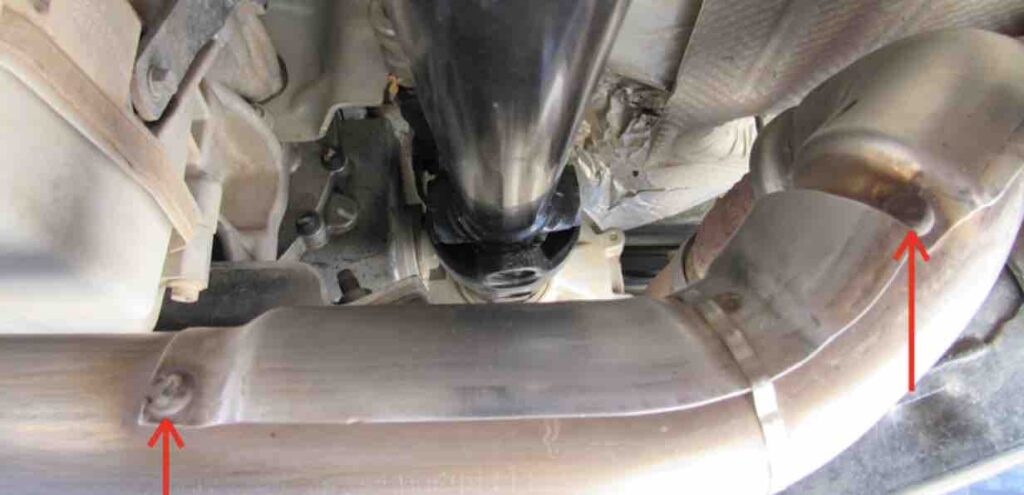The catalytic converter plays an important role in turning dangerous fumes into cleaner and less harmful gases. When it malfunctions, not only is its core function neglected but other parts of your engine will also be affected.
If you notice that you have a damaged catalytic converter while driving, your best course of action is to;
- Park your vehicle at the side of the road.
- Run a simple or complete diagnosis (depending on the available tools).
- Or either contact your mechanic and have your car tolled to his workshop.
Driving with a damaged catalytic converter is just like running with a bleeding wound. While it can be quite easy and cost-effective to carry out repairs when the malfunction starts, it will become more expensive as more issues stack up.
Continue reading to learn more about this topic and what you need to do when you notice your catalytic converters malfunction.
Related Article: The Cheapest Way to Fix Catalytic Converter, Cost & How to Fix

Driving With A Bad Catalytic Converter
Driving long distances with a bad catalytic converter puts a strain on your engine. This strain on your engine makes it expend more effort than it normally needs to maintain the operation of your vehicle. This will in turn affect multiple car parts in the long run.
With many car parts requiring repair or replacement, there will be more strain on your budget. Therefore, it is important that you keep an eye out for symptoms of damaged car parts and make repairs where necessary. To avoid being caught off guard, carry out periodical maintenance checks to keep your car in top form.
What happens if you keep driving with a bad catalytic converter?
If you drive your car with a bad catalytic convert, you could face serious consequences. The most common are:
- You will notice Increased emissions: A faulty catalytic converter will simply not reduce harmful pollutants or gases meant to come out through the exhaust and such will, lead to increased emissions. This is not only harmful to the environment, but it also violates most emission laws.
- You may experience reduced Fuel efficiency: A bad catalytic converter can also cause high fuel consumption, which can result in your car requiring more fuel leading to higher prices.
- Engine performance with lower: A damaged catalytic converter could restrict exhaust gass flow. This can lead to a decrease in engine performance, such as poor acceleration or loss of power.
- Other engine components can be damaged: A bad catalytic convert can also cause excess heat to build-up in the exhaust system. This can cause damage to other engine parts such as the oxygen sensors and mufflers.
- You may face legal consequences: Vehicle emissions exceeding the legal limit can lead to fines, penalties, and even vehicle impoundment because most US states require you to have a functional catalytic converter to reduce pollution of the environment.
It is crucial to fix a P0430 error code to avoid any negative consequences. Also, read this post will Catalytic Converter Cleaner Fix P0430 Error Code? I believe it will be of help to you.
In the next section, we will be highlighting, in detail, the important signs you need to look out for.
Signs Of A Bad Catalytic Converter
1. Reduced Engine Performance
This is among the first indications that it’s time to replace your catalytic converter. You’ll notice that your car will suddenly start functioning substantially worse than it did previously.
The most typical reason is that your catalytic converter is clogged. This prevents your engine’s emissions from being removed quickly enough. Therefore, your engine won’t operate as efficiently as it should.
2. Gas Mileage
One of the first signs you might notice is that your fuel usage will become irregular. Although getting better mileage may seem like a good deal, it will harm your engine and lead to even more costly repairs.
Due to this irregular fuel combustion, the exhaust is bound to get clogged. Also, your car’s engine will become far less effective as a result of this issue not being fixed quickly. Therefore, even if lower fuel consumption seems favorable, a defective catalytic converter will eventually lead to higher fuel usage.
3. Catalytic Converter’s Housing
When your catalytic converter is blocked or overheating, the housing is likely to change its color to blue or another color. When you notice this, it is a sign that your engine is not operating at full capacity since unburned fuel will then enter the catalyst converter.
In this situation, the mixture in your converter will ignite, heat up, and melt its inner material. If it is left unattended, your catalytic converter will become even more clogged. When your catalytic converter is clogged, other parts of the engine will also become overheated.
4. Engine Misfiring
Your engine requires a large amount of oxygen to carry out the required fuel combustion. Engine misfiring occurs when is process is restricted, that is when your catalytic converter gets clogged.
Additionally, overheating from an overabundance of unburned gases will harm other parts of the engine. It is not advisable to drive with a misfiring engine. You should have it addressed as soon as you can. Why? This is because delaying treatment could result in more costly problems or a complete breakdown.
5. Increase In Emission
There will be an increase in your car’s emissions if the catalytic converter is broken or blocked. This symptom is one of the easiest to notice because the catalytic converter’s primary function is to reduce harmful emissions.
Whether your car is idle or driving at high speed, the emissions will be unusually darker than normal. With this, your vehicle will ultimately fail its emission test. To prevent this from happening, carry out regular vehicle check-ups.
How Long Will A Bad Catalytic Converter Last?
If a catalytic converter is bad, it is simply bad; though it will not affect the regular option of your vehicle, it will be able to perform its function, which is too harmful emissions while driving.
So if I should be direct, I will say a bad catalytic converter can last long, almost indefinitely; however, you may be violating the emission control regulation. This is because your car can still be driven even if your catalytic converter is not plugged into your vehicle’s emission system. But not note that in some cases this may cause damage to your car engine in the long run.
While a damaged CAT will not prevent your car from running, it is not recommended to drive it in such a condition. Therefore, carry out regular check-ups to prevent your engine from suffering due to excessive exhaust gas pressure or performance loss.
Can A Bad Catalytic Converter Ruin Your Engine?
Yes, a bad catalytic converter can damage your engine. This is because, due to its malfunction, other engine parts will be affected, and these engine parts usually get faulty or completely damaged.
With these failing parts, your car engine will eventually suffer significantly. This chain of action will typically continue until the engine system inevitably collapses. While a bad catalytic converter might not ruin your engine instantly, it can start the process.
Can A Bad Catalytic Converter Cause a Car To Shut Off?
Yes, your car can shut off if your catalytic converter malfunctions. This shouldn’t come as a surprise as it plays a key role that affects many parts of your engine. However, before the shutdown, your car will only operate less effectively.
You need to take this seriously because your car could shut off while you’re driving. Therefore, it can be a very serious safety risk for you. As a result, you need to have an experienced mechanic handle this problem when you notice the symptoms.
Conclusion
Driving with a damaged catalytic converter is bad news no matter how you look at it. In this article, we have covered all you need to know on this topic. Making early repairs or replacements is a better choice than procrastinating. With this, you will be able to maintain your vehicle’s top-notch performance.
Related Articles:
- Free Catalytic Converter Price Guide(Scrap Worth/ Price List)
- Catalytic Converter Heat Shield Rattle fix
- Are Catalytic Converters Worth More As Scrap Or When Functional In A Vehicle?
Reference:
https://mechanicbase.com/engine/bad-catalytic-converter-symptoms/
https://www.fiix.io/car-advice/articles/4-signs-of-a-failing-catalytic-converter
https://www.autospecialtyoflafayette.com/blog/4-signs-of-a-clogged-catalytic-converter/
https://carphrases.com/can-a-bad-catalytic-converter-ruin-your-engine/
https://seeburgmufflerskc.com/2018/11/07/signs-you-need-to-replace-your-cars-catalytic

Uchenna is a Radiographer and Auto parts mechanic who recently got his automotive diploma as an auto repair technician, and since then, has worked on fixing various car problems.
Working as just a radiographer, Uchenna didn’t just get all the fulfillment he desired, because he truly loved doing things tilted toward cars. As a kid, he would take apart his toy cars to see how they worked and would spend hours tinkering with his bike.
So, in 2017 he made the tough decision to become an auto mechanic. He threw himself into his studies and now loves every aspect of what he does.
He gets to work with his hands, solving problems and bringing cars back to life, and sharing his knowledge and easy quick-fix guide online are all part of what makes him feel fulfilled.


